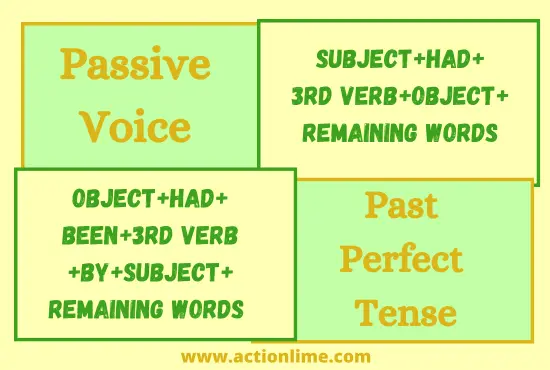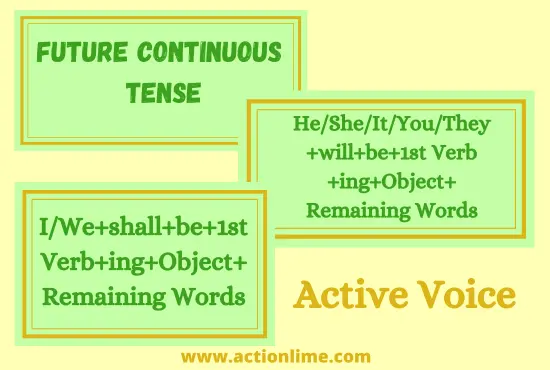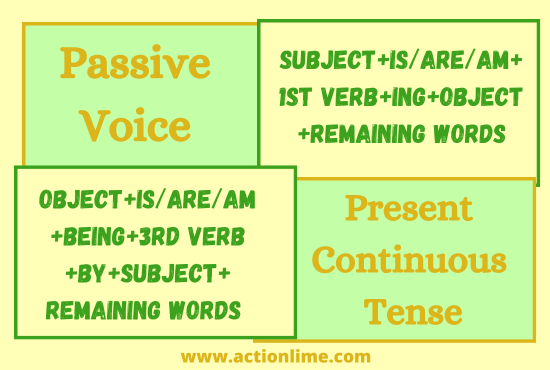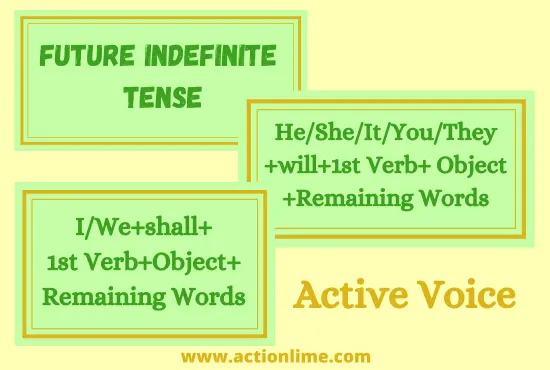Future Perfect Tense|Passive Voice
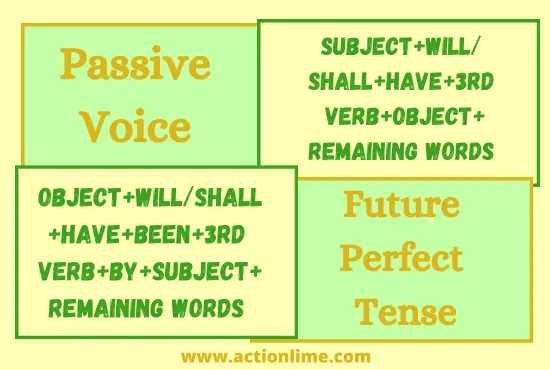
Future Perfect Tense(Passive Voice) indicates the passive completed actions of the future time. The Active Voice Sentences of Future Perfect Tense can be converted to Passive Voice Sentences of Future Perfect Tense, one must just follow the following General Rules.
Rules to Convert Future Perfect Tense(Active Voice) Sentences to Passive Voice Sentences
To go from the Active Voice form to the Passive Voice form of Future Perfect Tense Sentences, one must follow the following General rules.
- First of all, convert the Objective case(me, us, you, them, him, her, it) of Active Voice Sentences of Future Perfect Tense to the Subjective case(I, we, you, they, he, she, it) to form Passive Voice Sentence.
- Then, use “will have been/shall have been” as a helping verb to show the completeness of the future action.
- Then, use the 3rd Verb to show the passive nature of the future time action.
- After that, use the preposition “by”, to show the actual doer of the action.
- Then, convert the Subjective case(me, us, you, them, him, her, it) of the Active Voice Sentences to Objective Case(I, we, you, they, he, she, it) to form Passive Voice Sentences.
- At the end, write the remaining words, if there are any in the Active Voice Sentences of Future Perfect Tense.
Helping Verbs of Future Perfect Tense(Passive Voice)
Following are 2 main helping verbs that can be used in Passive Voice Sentences of Future Perfect Tense to represent the passive completed actions of the future time.
“Will Have Been” As Helping Verb In Future Perfect Tense(Passive Voice) Sentences
“Will have been” is used as a helping verb with all Singular and Plural Number Nouns “You, They, He, She, It”, except 1st Person Personal Pronouns “I, We”, to indicate the passive completed actions of the future time. Thus, Passive Voice Sentences of Future Perfect Tense with “will have been” as a helping verb have the following Sentence Structure.

“Shall Have Been” As Helping Verb In Future Perfect Tense(Passive Voice) Sentences
“Shall have been” is used with only 1st Person Personal Pronoun “I, We”, to indicate the passive completed actions of the future time. Thus, Passive Voice Sentences of Future Perfect Tense with the helping verb “shall have been”, have the following Sentence Structural formula.
I/we+ shall+ have+ been+ 3rd Verb+ by+ Subject+ Remaining Words

Sentence Structure of Future Perfect Tense(Passive Voice)
Following are the Sentence Structural formula for Assertive, Negative, Interrogative, and Negative-Interrogative Sentences of Future Perfect Tense(Passive Voice).
Assertive Sentence Structure of Future Perfect Tense(Passive Voice)
Assertive Sentences of Future Perfect Tense(Passive Voice), uses “will have been/shall have been”, as helping verbs with respective Singular and Plural Number Nouns to indicate the passive completed actions of the future time. Thus, Passive Assertive Sentences of Future Perfect Tense have the following Sentence Structural formula.
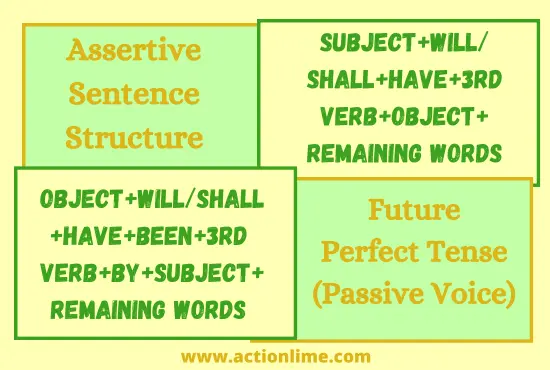
Examples of Assertive Sentences of Future Perfect Tense(Passive Voice)
Following are some examples of Assertive Sentences of Future Perfect Tense(Passive Voice).
- I shall have won a prize.
- A prize will have been won by me.
- We shall have finished that book.
- That book will have been finished by us.
- You will have cheated us.
- We shall have been cheated by you.
- They will have forgiven me.
- I shall have been forgiven by them.
- He will have beaten them.
- They will have been beaten by him.
- She will have learned this poem by heart.
- This poem will have been learned by her by heart.
- The team will have completed the project by next week.
- The project will have been completed by the team by next week.
- He will have given me the report by next week.
- I shall have been reported by him by next week.
- The report will have been given to me by next week.
- The team will have informed us of the decision by the end of the day.
- We shall have been informed by the team of the decision by the end of the day.
- They will have given you the report.
- You will have been given the report by them.
- The report will have been given to you by them.
- She will have told them the news before dinner.
- They will have been told the news by her before dinner.
- The news will have been told to them by her before dinner.
- She will have shown him the new project.
- He will have been shown the new project by her.
- The new project will have been shown to him by her.
- They will have sent her the invitation by tomorrow.
- She will have been sent the invitation by them by tomorrow.
- The invitation will have been sent to her by them by tomorrow.
- She will have written the book by the end of the year.
- The book will have been written by her by the end of the year.
Negative Sentence Structure of Future Perfect Tense(Passive Voice)
Passive Negative Sentences of Future Perfect Tense take “not”, between the helping verbs “will/shall” and “have been”, to indicate the negative nature of Passive completed actions of the future time. Thus, Negative Sentences of Future Perfect Tense(Passive Voice) have the following Sentence Structural formula.
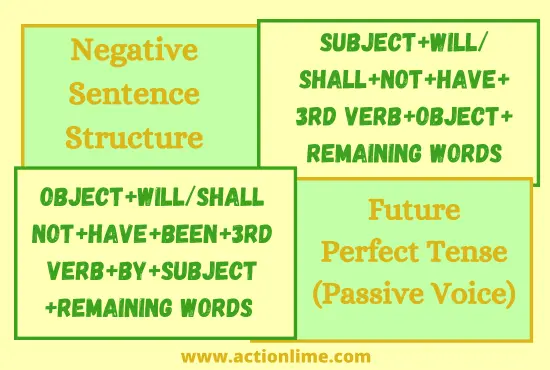
Examples of Negative Sentences of Future Perfect Tense(Passive Voice)
Following are some examples of Negative Sentences of Future Perfect Tense(Passive Voice).
- I shall not have pleased them.
- They will not have been pleased by me.
- We shall not have copied our letters.
- Our letters will not have been copied by us.
- You will not have blamed her.
- She will not have been blamed by you.
- They will not have cooked their meal.
- Their meal will not have been cooked by them.
- He will not have joined that college.
- That college will not have been joined by him.
- She will not have selected me for this post.
- I shall not have been selected by her for this post.
- The museum curator will not have opened the exhibit.
- The exhibit will not have been opened by the museum curator.
- They will not have visited me.
- I shall not have been visited by them.
- She will not have informed us about the decision by tomorrow.
- We will not have been informed by her about the decision by tomorrow.
- He will not have emailed you the agenda.
- You will not have been emailed the agenda by him.
- I shall not have called them.
- They will not have been called by me.
- We will not have visited him twice.
- He will not have been visited by us twice.
- He will not have sent her the documents by tomorrow.
- She will not have been sent the documents by him by tomorrow.
- The documents will not have been sent to her by him by tomorrow.
- They will not have constructed the bridge by the start of winter.
- The bridge will not have been constructed by them by the start of winter.
Interrogative Sentence Structure of Future Perfect Tense(Passive Voice)
Interrogative Sentences of Future Perfect Tense(Passive Voice) uses “will/shall”, at the start of Sentences to show the Interrogative/questionable nature of the passive completed actions of the future time. Thus, Interrogative Sentences of Future Perfect Tense(Passive Voice), have the following Sentence Structure.

Examples of Interrogative Sentences of Future Perfect Tense(Passive Voice)
Following are some examples of Interrogative Sentences of Future Perfect Tense(Passive Voice).
- Shall I have finished my work yet?
- Will my work have been finished by me yet?
- Shall we have brought some gifts for our friends?
- Will some gift have been brought by our friends?
- Will you have auctioned my car?
- Will my car have been auctioned by you?
- Will they have cut that cake?
- Will that cake have been cut by them?
- Will he have returned the tickets by now?
- Will the tickets have been returned by now?
- Will she have locked the cupboard?
- Will the cupboard have been locked by her?
- Will the lawyer have finalized the contract?
- Will the contract have been finalized by the lawyer?
- Will he have introduced me to the team?
- Shall I have been introduced by him to the team?
- Will he have invited us by tomorrow?
- Shall we have been invited by him by tomorrow?
- Will she have called you by noon?
- Will you have been called by her by noon?
- Will he have met them by next week?
- Will they have been met by him by next week?
- Will they have met him by tonight?
- Will he have been met by them by tonight?
- Shall I have seen her by the end of the day?
- Will she have been seen by me by the end of the day?
- Will the company have launched the product by next month?
- Will the product have been launched by the company by the next month?
Negative-Interrogative Sentence Structure of Future Perfect Tense(Passive Voice)
Negative-Interrogative Sentences of Future Perfect Tense(Passive Voice), have “will/shall”, at the start of Sentences to indicate the interrogative/questionable nature of the actions. And “not have been”, comes after the “Subject”, to indicate the negative passive completed nature of the future actions. Thus, Negative-Interrogative sentences of Future Perfect Tense(Passive Voice), have the following Sentence Structural formula.

Examples of Negative-Interrogative Sentences of Future Perfect Tense(Passive Voice)
Following are some examples of Negative-Interrogative Sentences of Future Perfect Tense(Passive Voice).
- Shall I not have taken them seriously?
- Will they not have been taken by me seriously?
- Shall we not have paid him the price in her presence?
- Will he not have been paid by us the price in her presence?
- Will the price not have been paid to him by us in her presence?
- Will you not have written this letter?
- Will this letter not have been written by you?
- Will they not have bought a new pen?
- Will a new pen not have been bought by them?
- Will he not have caught the train?
- Will the train not have been caught by him?
- Will she not have helped them?
- Will they not have been helped by her?
- Will the studio not have released the movie?
- Will the movie not have been released by the studio?
- Will they not have informed me by the next Friday?
- Shall I not have been informed by them by the next Friday?
- Will she not have picked us up by 6 PM?
- Shall we not have been picked up by her by 6 PM?
- Will he not have paid you by the end of the month?
- Will you not have been paid by him by the end of the month?
- Will I not have told them everything by tomorrow morning?
- Will they not have been told everything by me by tomorrow morning?
- Will everything not have been told to them by me by tomorrow morning?
- Will she not have met him before the meeting starts?
- Will he not have been met by her before the meeting starts?
- Will I not have emailed her the report by the end of the day?
- Will she not have been emailed the report by me by the end of the day?
- Will the report not have been emailed to her by me by the end of the day?
- Will we not have finished the report before the deadline?
- Will the report not have been finished by us before the deadline?
